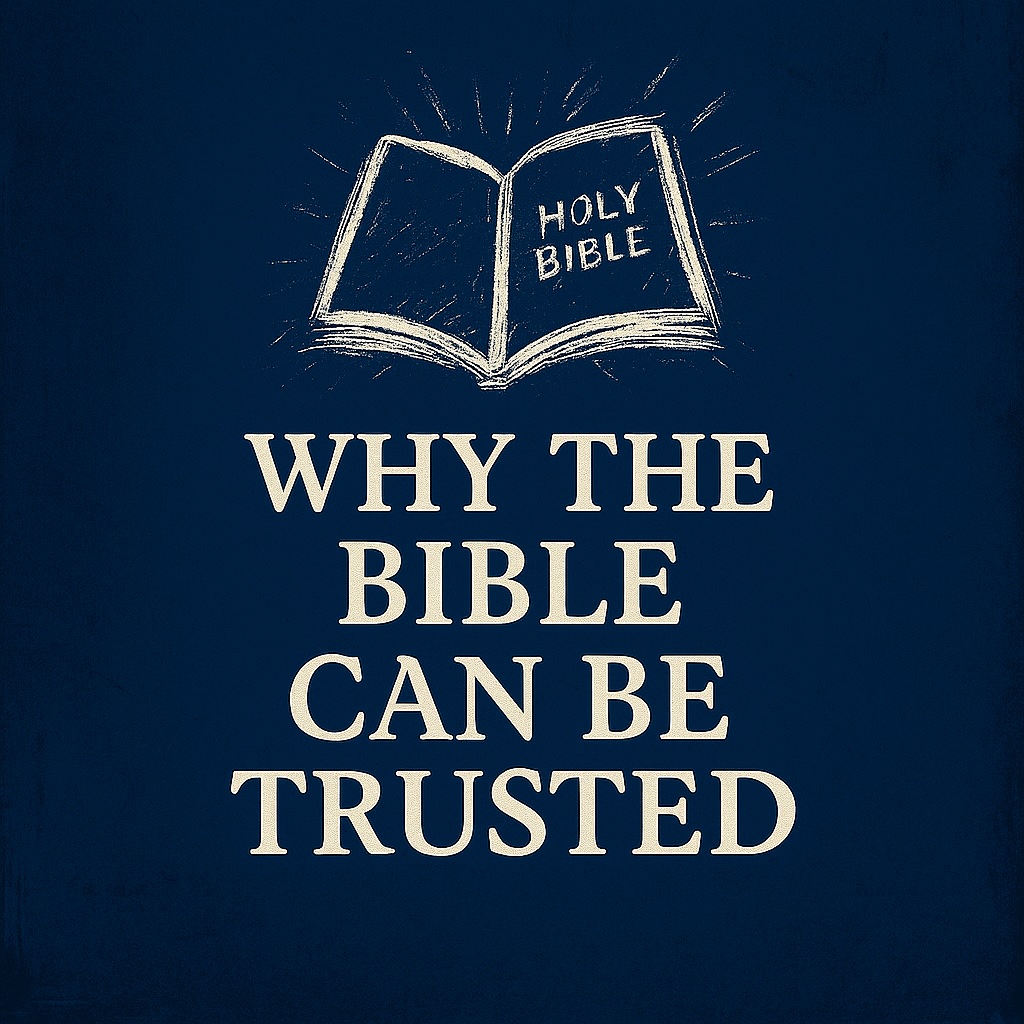The Foundation of Faith and Truth
Every belief system has a foundation. For Christians, that foundation is Scripture. Yet the question arises again and again: Can we really trust the Bible?
Apologetics begins here, because if the Bible cannot be trusted, then everything built upon it falls apart. But if it is true, then its message carries the full weight of divine authority.
Faith does not ask us to ignore evidence. God never asked His people to believe blindly. Throughout history, He provided proof that His Word is trustworthy — historically, prophetically, and spiritually.
How We Know the Bible Is Historically Reliable
When scholars evaluate any ancient document, they ask three questions:
- How many original copies or manuscripts exist?
- How close are those copies to the time of the original writing?
- How consistent are those manuscripts with one another?
By these measures, the Bible stands alone among all ancient literature.
- The New Testament is supported by more than 5,800 Greek manuscripts, 10,000 Latin manuscripts, and over 9,000 early translations.
- Some of these copies date within 25 to 100 years of the originals, a time span unheard of for other works of antiquity.
- When compared, the manuscripts agree with more than 99 percent accuracy. The small remaining differences are grammatical or spelling variations that do not change meaning or doctrine.
To put this in perspective:
- Homer’s Iliad has 643 manuscripts, with a 500-year gap between the original and the earliest copy.
- The writings of Plato and Aristotle exist in fewer than 20 copies, each separated by over 1,000 years.
No historian rejects those works as unreliable. Yet the Bible, with thousands of manuscripts written within living memory of the events, is often dismissed — not because of lack of evidence but because of what it claims: that it is the Word of God.
Archaeology Confirms the Record
For centuries, skeptics claimed the Bible’s historical details were exaggerated or mythical. Yet time and again, archaeology has proven Scripture’s accuracy.
- Critics once said the Hittites never existed. Later, archaeologists uncovered entire Hittite cities and royal archives in modern-day Turkey.
- Scholars doubted King David was real until the Tel Dan Inscription was discovered in northern Israel, referring directly to the “House of David.”
- Luke’s writings in the Gospel and Acts were once questioned for geographical and political details. Archaeological discoveries have since confirmed his accuracy in every known case.
Archaeology does not create faith, but it continually confirms what faith already knows — the Bible records real people, real places, and real events.
Prophecy: The Divine Signature
Perhaps the clearest evidence of divine authorship is fulfilled prophecy.
Throughout the Old Testament, God declared future events with precision that no human could achieve.
- Isaiah 44–45 foretold by name that Cyrus, king of Persia, would free Israel from captivity — written nearly 150 years before Cyrus was born.
- Micah 5:2 predicted that the Messiah would be born in Bethlehem, a prophecy fulfilled in the birth of Jesus.
- Zechariah 11:12–13 foretold the betrayal of the Messiah for thirty pieces of silver, fulfilled exactly in Matthew 26:15.
- Psalm 22 describes crucifixion in vivid detail — centuries before the Romans even invented it as a form of execution.
These prophecies are not vague statements that can fit any event. They are precise predictions recorded long before their fulfillment. The odds of even eight prophecies being fulfilled by one person are statistically impossible without divine involvement.
Fulfilled prophecy is God’s signature written across the pages of history.
A Unified Message Written Across Centuries
Another powerful proof of divine authorship is unity.
The Bible is not a single book written by one author in one time period. It is a library of 66 books, written by more than 40 authors, over a span of 1,500 years, across three continents and three languages.
Its writers include kings, farmers, shepherds, soldiers, fishermen, doctors, and tax collectors. Despite this diversity, the message is unified:
- Humanity is broken.
- God loves us and provides redemption.
- That redemption comes through Jesus Christ.
Try finding another collection of writings across so many generations that maintains perfect harmony of theme and truth. None exist. The consistency of the Bible is humanly impossible. It reflects one Author guiding many hands — the Spirit of God.
Why We Can Trust the Bible Spiritually
Historical and textual evidence are powerful, but they are not the only reasons believers trust Scripture. The Bible does something that no other book can do. It changes lives.
Hebrews 4:12 says, “For the Word of God is alive and powerful. It is sharper than any two-edged sword.”
This means the Bible does not simply inform. It transforms.
It convicts the heart, reveals truth, and restores hope.
Every time we read it, the Author speaks.
The same Spirit who inspired the writers continues to illuminate the readers. That is why the Bible remains alive across generations. It is not a relic of the past. It is the voice of the living God.
The Philosophical Reality: Truth Beyond Time
Philosophically, the Bible stands as the bridge between eternity and history. If God exists, He must be able to communicate. The Bible is that communication — divine truth translated into human words.
Skeptics often ask, “How can we know God wrote it?” The answer is simple: no human could have. No group of writers could maintain unity across centuries, predict the future with perfect accuracy, and speak words that still pierce the soul today.
The Bible does not just tell us about God. It shows that He is alive, speaking, and unchanging.
Why It Matters
If the Bible is trustworthy, then its message demands a response. It is not just a moral guide or historical record. It is the living revelation of the Creator to His creation.
It tells us who we are, why we exist, and how to be redeemed through Jesus Christ — the same Jesus who is alive today.
To trust the Bible is to trust the One who breathed it into existence.
If you have ever doubted the Bible’s authenticity, begin with this: read it for yourself.
Examine the evidence, study its history, and let its truth speak to your heart.
The Bible has survived empires, criticism, and centuries of attack for one reason — it was not written by man alone.
It was written by God.
And His Word still speaks today.

